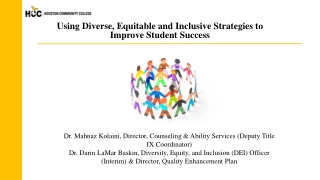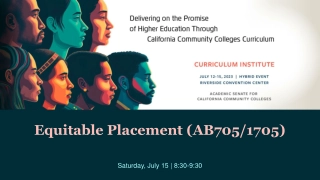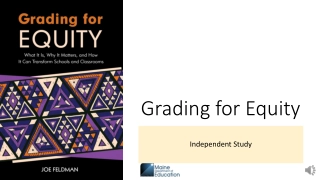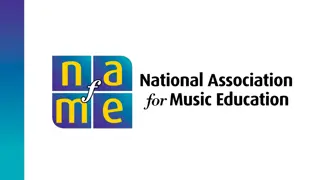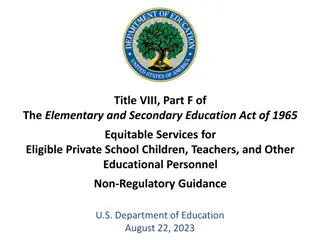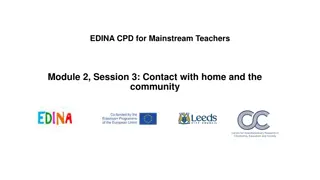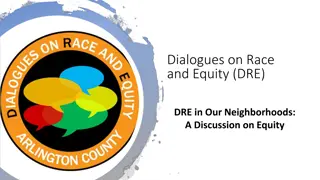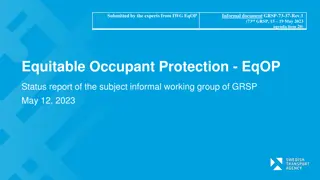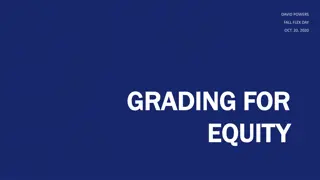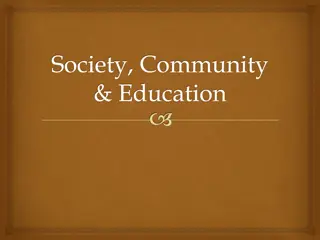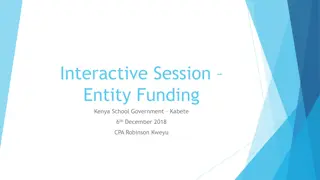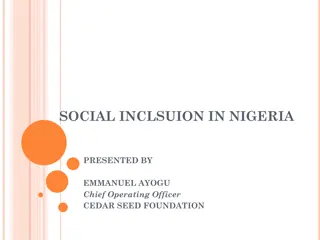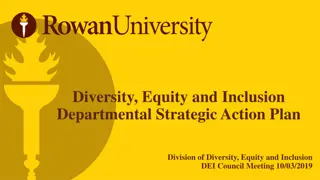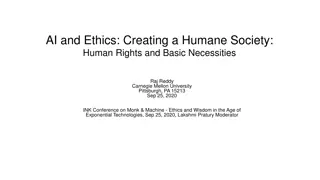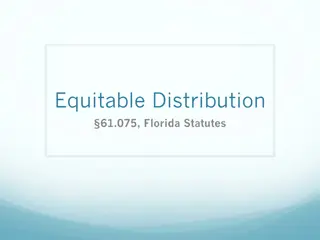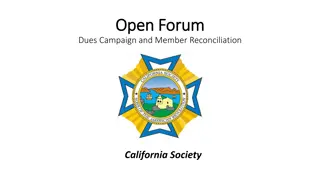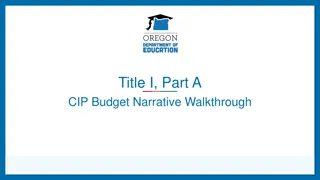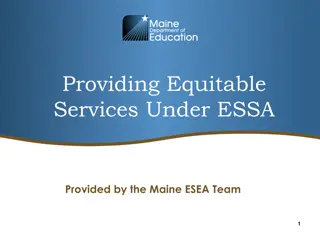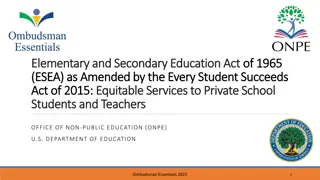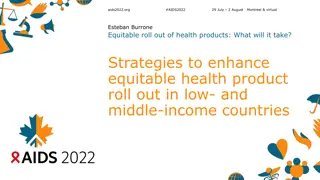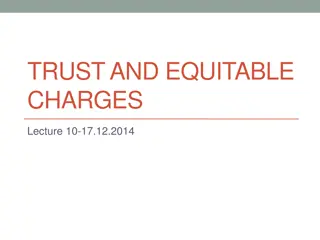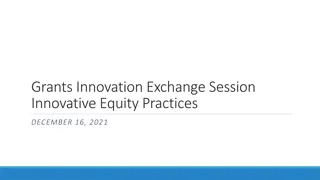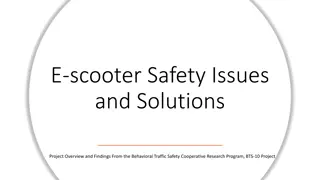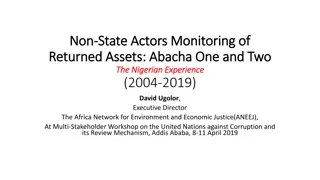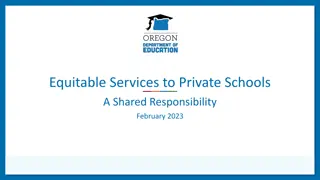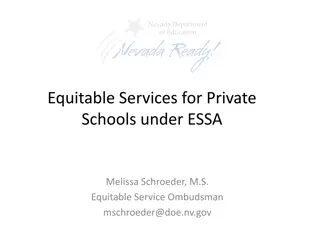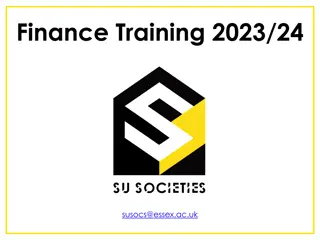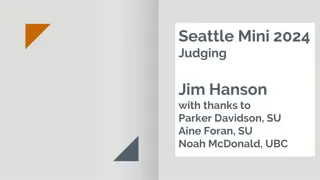Society 5.0 - Co-creating the Future
The concept of Society 5.0 for SDGs in this informative presentation by NAKAJIMA Koh, Deputy Director at Keidanren (Japan Business Federation). Discover how technological advancements and digital transformation are shaping the future of society, and the role of social partners in creating a data-dri
17 views • 37 slides
Using Diverse, Equitable, and Inclusive Strategies for Student Success
How Houston Community College implements diverse, equitable, and inclusive strategies to improve student success and create an inclusive learning environment.
0 views • 27 slides
Pi Mu Epsilon Honor Society Induction Ceremony and History
The 49th Annual Induction Ceremony of the North Carolina Zeta chapter featured advisor Dr. Russell Herman. Established to promote mathematical scholarship, Pi Mu Epsilon Honor Society has fourteen NC chapters including Duke University and UNC Chapel Hill. The society's pledge emphasizes promoting tr
2 views • 11 slides
Equitable Placement Strategies for Student Success
Explore the impact of AB 1705 on student placement and enrollment, as outlined by the California Community Colleges Chancellor's Office. Join the session to discuss challenges, share successes, and strategize innovations to enhance student success and close equity gaps. Learn about the ASCCC paper o
0 views • 16 slides
Grading for Equity Independent Study Program
Explore the concepts of equitable grading with a focus on historical context, bias recognition, and motivational elements. Join thought partners in studying Joe Feldman's book to transform grading practices for all students. Engage in live facilitated discussions and sessions to delve into the princ
3 views • 11 slides
ICC Renewable Energy Access Workshop Overview
The ICC Renewable Energy Access Plan workshops aim to discuss the implementation of CEJA (Climate and Equitable Jobs Act), focusing on clean energy goals and renewable energy transitions in Illinois. The workshops provide insights, analysis, and opportunities for stakeholder feedback to ensure a jus
3 views • 31 slides
NAfME: Empowering Music Educators for Equitable Access
Collaborate with NAfME, a supportive community advocating for equitable music education access. Experience a diverse association where everyone is valued, heard, and included in their musical journey. Discover the transformative power of music, connecting people across cultures and time, fostering c
2 views • 19 slides
Latin America Society of American Nuclear Society - Overview and Governance
The Latin American Section of the American Nuclear Society (LAS/ANS) was established in 1975 to represent nuclear professionals across Latin America. It focuses on promoting nuclear science and technology in various fields, facilitating research and education, organizing technical meetings, and fost
3 views • 43 slides
Equitable Services for Private School Children and Teachers
The Elementary and Secondary Education Act of 1965, specifically Title VIII, Part F, outlines the provision of equitable services for eligible private school children, teachers, and other educational personnel. This non-regulatory guidance emphasizes the importance of ensuring fairness and support f
4 views • 32 slides
Understanding Civil Society: Concepts, Challenges, and Implications
Explore the dynamics of civil society, from its dense network of groups to its role in democracy. Delve into the typology of Civil Society Organizations, the connection between civil society and democracy, and the unique landscape of civil society in Norway. Engage in thought-provoking discussions o
0 views • 9 slides
Enhancing Education Through Family and Community Engagement
Inclusive and equitable education is achieved through effective family and community engagement, which positively impacts student achievement. Engagement dimensions include providing a secure environment, intellectual stimulation, and active participation in school activities. Building equitable rel
0 views • 8 slides
Understanding Equity and Inclusion in Our Communities
Explore the concepts of diversity, inclusion, equality, and equity in our neighborhoods. Learn how representation, participation, and tailored solutions can help bridge gaps and create a more equitable society. Embrace conversations on race and equity to strive for a fairer and more inclusive commun
1 views • 10 slides
Progress Report on Equitable Occupant Protection Working Group
The Informal Working Group on Equitable Occupant Protection (IWG EqOP) has made significant strides in enhancing the safety and protection of a diverse population, focusing on passenger car occupants. The IWG's workplan includes tasks related to regulatory changes, addressing diversity issues, and a
0 views • 12 slides
Understanding Gender Stratification and Its Impact on Society
Gender stratification is the unequal distribution of rewards, power, and prestige between men and women in society, leading to disparities in access to resources and opportunities. Men are often favored over women, resulting in fewer females in influential positions and limited decision-making power
0 views • 8 slides
Equitable Grading Practices: Pillars, Zero Policies, and Minimum Grading
Explore the three pillars of equitable grading: accuracy, bias-resistance, and motivation. Learn about the impact of giving zeros on student grades and discover alternative approaches. Delve into the concept of minimum grading and how adjusting grading scales can enhance student engagement and succe
1 views • 48 slides
Understanding the Elements of Society: Society, Community & Education
Society is a complex web of social relationships characterized by likeness, inter-dependence, and cooperation among individuals. It is not just a group of people but a system of organized associations and communication within a community. With elements like similarity, diversity, inter-dependence, a
0 views • 23 slides
The Importance of Education in Society
Education is a fundamental human right that should be accessible to all individuals regardless of background. It plays a crucial role in shaping individuals, communities, and nations. Government programs and initiatives such as the K-12 program aim to provide equitable education opportunities for al
5 views • 20 slides
County Government Revenue Sources and Allocation in Kenya
The county government revenue in Kenya is sourced from various avenues such as property rates, entertainment taxes, and service charges. Equitable share forms a significant part of this revenue, allocated based on a formula developed by the Commission on Revenue Allocation. The funds given through t
0 views • 14 slides
Enhancing Social Inclusion for a Diverse Society: A Focus on Nigeria
The concept of social inclusion as a key goal of development was emphasized at the World Summit for Social Development in 1995. It aims to ensure equal opportunities for all individuals to actively participate in various aspects of society, combatting poverty and exclusion. Social exclusion, on the
0 views • 19 slides
Rowan University DEI Strategic Action Plan Overview
Rowan University emphasizes diversity, equity, and inclusion (DEI) through its strategic action plan, aiming to create a more inclusive and equitable campus community. The plan involves assessing departmental strengths and areas for improvement, setting goals and objectives, and engaging all faculty
1 views • 15 slides
Embracing Human Rights and Sustainable Development for a Better Society
Exploring the importance of serving society by upholding universal human rights and embracing sustainable development goals set by the United Nations. This involves advocating for equality, liberty, access to basic needs, and addressing societal challenges such as poverty, hunger, healthcare, educat
0 views • 10 slides
Private Schools: CARES Act Equitable Services Overview
This session introduces and discusses the implications of the CARES Act Equitable Services for private schools, including a timeline of events, court decisions, and implications for districts and private schools. The presentation covers the requirement for LEAs to provide equitable services to non-p
2 views • 12 slides
Understanding Equitable Distribution in Florida
Equitable distribution in Florida, governed by statutes 61.075 and 61.076, determines the fair division of marital assets and liabilities in divorce cases. Key considerations include identification, valuation, distribution presumption, and justification for unequal distribution. Assets are classifie
0 views • 28 slides
Understanding Equitable Services to Independent Schools
Explore the guidelines for providing federal education aid to students in need attending independent schools, as mandated by the Elementary and Secondary Education Act. Learn about eligibility criteria, consultation processes, and funding allocation. Discover the complexities of Title I eligibility
0 views • 46 slides
Enhancing Civil Society Engagement in the Global Financing Facility (GFF)
Explore key tools and strategies for enhancing civil society engagement in the GFF, including the Civil Society Engagement Strategy, guidance notes, CSO resources, and the value of civil society in RMNCAH+N. Learn how civil society can contribute to advocacy, monitoring, accountability, and more tow
0 views • 16 slides
California Society Membership and Dues Reconciliation Processes
Dive into the membership and dues reconciliation procedures of the California Society, highlighting key dates, life membership programs, and documentation requirements. Learn about old and new life member programs, important deadlines, and the significance of each step in the reconciliation process
0 views • 24 slides
Understanding Title I, Part A CIP Budget Narrative Requirements
This walkthrough explains the purpose of Title I, Part A funds, focusing on providing equitable education opportunities and addressing achievement gaps for students in need. It covers important aspects such as the Supplement Not Supplant rule, federal funds timeline, and consultation for equitable s
1 views • 26 slides
Equitable Services Requirements and Guidelines under ESSA
Equitable Services Requirements and guidelines under ESSA outline the responsibilities of education officials, ombudsman, and private school administrators to ensure fair distribution of federal funds. The ESEA Team in Maine works to uphold Title I, Part A, Migrant Education, Teacher Quality, Englis
0 views • 56 slides
Education Act of 1965 and Equitable Services for Private School Students
The Elementary and Secondary Education Act (ESEA) of 1965, as amended by the Every Student Succeeds Act in 2015, ensures equitable participation of private school students and teachers in federal education programs. The Office of Non-Public Education (ONPE) oversees this initiative, providing resour
0 views • 30 slides
Enhancing Equitable Health Product Roll-out in Low- and Middle-Income Countries
Strategies to enhance equitable access to health products in low- and middle-income countries will be discussed at the AIDS 2022 conference, focusing on key factors such as availability, acceptability, affordability, accessibility, and quality. The Medicines Patent Pool aims to increase access to in
0 views • 14 slides
Understanding Trust and Equitable Charges in Property Law
Trust and equitable charges in property law involve a legal obligation where the property holder manages the property for the benefit of another person. This trust relationship consists of elements like legal title, trust property, and beneficiaries. The creators of a trust can be referred to as set
0 views • 25 slides
Grants Innovation Exchange Session on Equitable Award Practices
Laura Watson and Lynn Rhinehart from the Department of Labor, along with Lynn Overmann from the USDA, discuss the impact of eligibility criteria on equitable outcomes of awards. They also share innovative practices related to the recent Controller Alert and OMB guidance, emphasizing the inclusion of
0 views • 12 slides
E-scooter Safety Issues and Solutions Project Overview
E-scooter safety research project BTS-10 investigated usage patterns, safety concerns, injury data, and safety management practices. The project aimed to identify key safety issues, current practices, and future research needs, emphasizing the importance of a safe and equitable transportation system
0 views • 38 slides
Monitoring and Recovery of Abacha Loot in Nigeria: The Civil Society's Advocacy Efforts
Civil society in Nigeria, led by organizations like ANEEJ, has been actively involved in monitoring and advocating for the recovery and transparent disbursement of assets stolen by the Abacha regime. Through initiatives like MANTRA, they have ensured that returned funds are used for the benefit of t
0 views • 10 slides
Revitalizing American Nuclear Society: Strategies for Success
The content discusses the revitalization efforts of the American Nuclear Society, focusing on key areas such as organizational and leadership changes, refocused vision and strategy, accountability, and culture change. It outlines the challenges faced by the society in June 2011 and presents a roadma
0 views • 18 slides
Equitable Services to Private Schools: Shared Responsibility and Requirements
Equitable services to private schools involve federal programs supported by tax dollars, allowing all children and teachers access to various educational programs. Private schools must be not-for-profit to qualify. Consultation plays a crucial role in reaching agreements on providing equitable and e
0 views • 17 slides
Understanding Equitable Services for Private Schools under ESSA
Equitable Services for Private Schools under ESSA ensures fair educational benefits for private school children, teachers, and personnel compared to public schools. Requirements cover various programs like Title I and Title IV, with an ombudsman role to enforce compliance. ESSA mandates separate pro
0 views • 29 slides
Understanding Society Finances: Roles, Accounts, and Reports
Roles and responsibilities of society finance leaders, managing society accounts, understanding weekly finance reports, and handling membership funds and other income sources. Emphasis on the importance of using only the official society account and receiving and reviewing weekly finance reports.
0 views • 36 slides
Tips for Being a Supportive and Equitable Debate Judge
When judging a debate, it is crucial to be supportive, equitable, and respectful of all participants. Providing opportunities for debaters to state their pronouns and important information, avoiding favoritism, and embracing diversity are key aspects of being a good judge. Actively listening, taking
0 views • 39 slides
University of Toronto Graduate Nurses Student Society Overview
The Graduate Nurses Student Society (GNSS) at the University of Toronto represents and advocates for graduate nursing students. It provides leadership, social involvement, mentorship activities, and promotes student-faculty engagement. The society's current executive team and council structure are o
0 views • 12 slides

